Pack your journal and head deep into Ontario’s wilderness, where the ancient pines and crystalline lakes become your natural therapists. Ecological retreat – the deliberate practice of immersing yourself in nature for mental restoration – transforms ordinary park visits into profound healing experiences.
In an age where screens dominate our attention and urban stress follows us everywhere, Ontario’s vast network of provincial parks and conservation areas offers a powerful antidote. Whether it’s the misty shores of Algonquin at dawn, the windswept cliffs of the Bruce Peninsula, or the quiet sanctuary of a local conservation area, these natural spaces provide the perfect setting for intentional nature connection.
This isn’t just another hiking guide – it’s your invitation to discover how combining mindful outdoor practices with Ontario’s wilderness can reset your nervous system, enhance creativity, and restore emotional balance. Through carefully chosen locations and proven eco-therapy techniques, you’ll learn to transform simple outdoor experiences into meaningful personal retreats.
Join us as we explore how to create your own ecological retreat experiences in Ontario’s most restorative natural spaces. From selecting the perfect location to mastering the art of nature journaling, this guide will help you craft moments of profound connection with the natural world.
Why Ontario Parks Are Perfect for Eco-Therapy Journaling
The Science Behind Nature’s Healing Power
Recent scientific studies have revealed fascinating insights into the healing power of nature, particularly when combined with mindful practices like journaling. Research shows that just 20 minutes in nature can significantly lower stress hormones like cortisol, while writing about our outdoor experiences helps process emotions and cement positive memories.
When we journal in natural settings, our brains enter a state similar to meditation. The gentle rustle of leaves, bird songs, and fresh forest air activate our parasympathetic nervous system – nature’s built-in relaxation response. Scientists have found that this combination can improve mood, boost creativity, and enhance immune function.
What makes this practice especially powerful is how it engages multiple senses. The act of writing while surrounded by nature creates stronger neural connections, helping us retain the calming benefits long after we’ve returned home. Studies conducted in Ontario’s forests have shown that participants who combined nature walks with journaling reported 60% better sleep quality and increased mental clarity for days afterward.
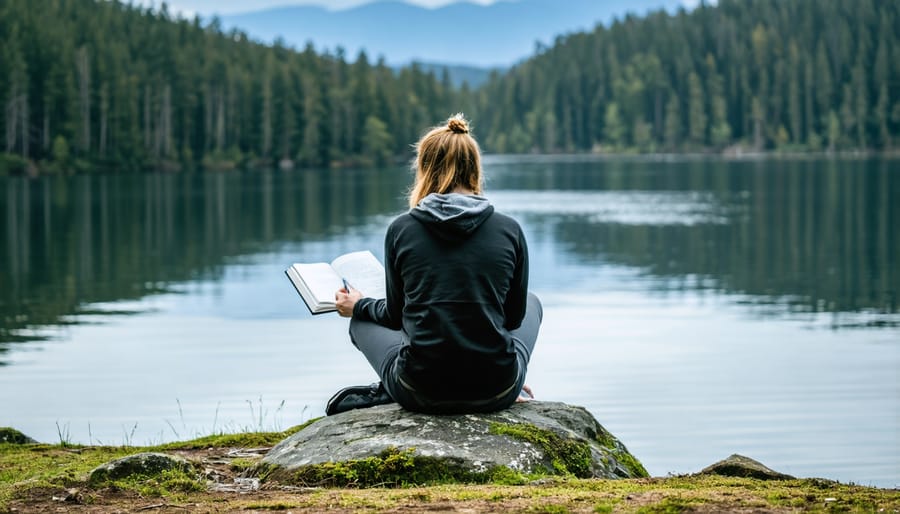
Best Seasons for Eco-Therapy Retreats
Ontario’s diverse seasons each offer unique opportunities for eco-therapy retreats, making year-round healing experiences possible. Spring brings renewal, with wildflowers blooming and migratory birds returning. It’s perfect for forest bathing and meditation as nature awakens from winter slumber, though be prepared for occasional rain showers.
Summer offers the widest range of activities, from sunrise yoga by the lakes to moonlit meditation sessions. The long daylight hours and warm weather create ideal conditions for extended outdoor therapy sessions, but remember to book well in advance as this is peak season.
Fall is perhaps the most magical time for eco-therapy in Ontario. The stunning autumn colors create a natural backdrop for mindfulness walks, while the crisp air and falling leaves add a sensory dimension to outdoor healing practices. The smaller crowds also allow for more intimate connections with nature.
Even winter has its charm for eco-therapy enthusiasts. Snow-covered landscapes provide a peaceful setting for contemplation, and winter activities like snowshoeing can be incorporated into therapy sessions. The stark beauty of bare trees and frozen lakes offers a unique perspective on nature’s cycles.
Top Eco-Therapy Journaling Locations in Ontario Parks
Peaceful Writing Spots in Frontenac Provincial Park
Tucked away in the rugged landscapes of Frontenac Provincial Park are several secluded spots perfect for writers seeking solitude and inspiration. The South Otter Lake lookout offers a peaceful perch where you can settle into your thoughts while overlooking the pristine waters below. Bring a comfortable camping chair or use one of the natural rock formations as your writing desk.
For those who prefer shade and shelter, the old-growth cedar grove near Big Salmon Lake provides a cathedral-like atmosphere. The filtered sunlight and gentle rustle of leaves create an ideal environment for journaling or creative writing. Remember to pack a waterproof blanket to sit comfortably among the moss-covered rocks.
One of the park’s best-kept secrets is the quiet cove along the Rideau Trail, about a 20-minute walk from the parking lot. Here, a fallen log serves as the perfect natural bench, and the rhythmic lapping of waves against the shore provides a soothing soundtrack for your writing session.
Early mornings at Arab Lake Gorge offer another tranquil setting, especially for nature writers. The morning mist rising from the water and the chorus of birdsong create an almost mystical atmosphere. Consider bringing a thermos of hot tea and arriving just before sunrise to experience the landscape at its most serene.
Remember to practice Leave No Trace principles while writing in these spots, and keep your voice low to preserve the peaceful atmosphere for fellow nature enthusiasts.
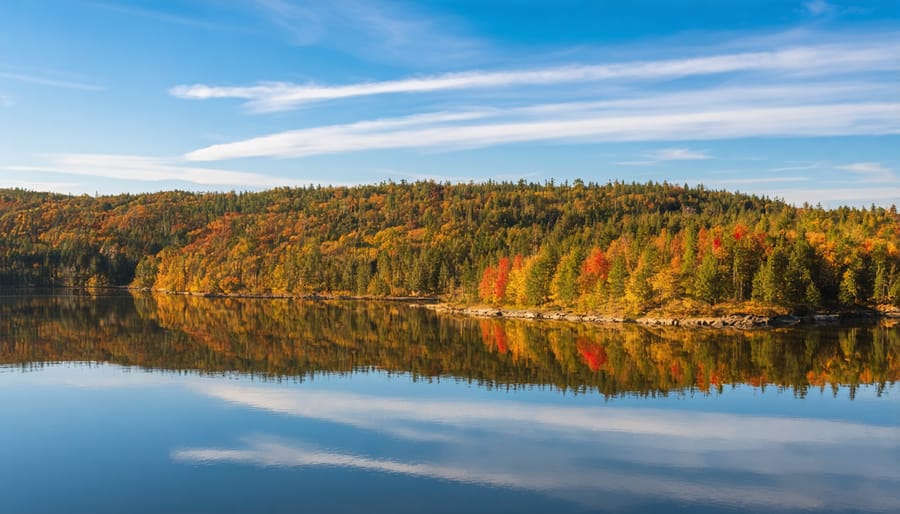
Algonquin’s Contemplative Corners
Tucked away in Algonquin Park’s vast wilderness are hidden gems that offer perfect spots for quiet reflection and mindful connection with nature. The Lookout Trail, perched 100 meters above Cache Lake, provides a breathtaking panoramic view that’s particularly magical during sunrise meditation sessions. Early morning visitors often find themselves alone with the mist rising from the valley below.
For those seeking deeper solitude, the Spruce Bog Boardwalk offers a less-traveled path through an ancient bog ecosystem. The weathered wooden walkway leads you through a landscape where time seems to stand still, with stunted black spruce trees and delicate bog plants creating an otherworldly atmosphere perfect for contemplation.
Beaver Pond Trail reveals another peaceful corner, especially in the golden hours before sunset. Find a comfortable spot on one of the smooth Canadian Shield rocks and listen to the gentle lap of water against the shore. Wildlife watchers might glimpse otters playing or herons fishing in absolute silence.
Pro tip: Pack a lightweight camping chair or cushion for extended meditation sessions. The West Gate area hosts several secluded picnic spots that double as excellent morning yoga locations. For the ultimate peaceful experience, visit mid-week during shoulder season (May or September) when the park sees fewer visitors and the weather remains pleasant for outdoor reflection.
Planning Your Eco-Therapy Journaling Retreat
Essential Packing List
Pack smart to make the most of your ecological retreat experience! Start with a reliable waterproof backpack and comfortable hiking boots. For journaling essentials, bring a sturdy notebook (preferably made from recycled paper), several pens, and colored pencils to sketch nature’s beautiful details.
Don’t forget weather-appropriate clothing – layer up with moisture-wicking base layers, a warm fleece, and a waterproof jacket. Pack a reusable water bottle, eco-friendly sunscreen, and natural bug spray. A compact first-aid kit is essential for peace of mind.
For enhanced nature connection, bring binoculars for wildlife watching and a pocket guide to local flora and fauna. A small camping cushion or lightweight blanket provides comfort during extended journaling sessions.
Tech-wise, pack a portable charger for emergencies, but consider limiting device use to photos only. A headlamp or flashlight is crucial for early morning or dusk journaling. Remember to pack waste-free snacks in reusable containers – trail mix, dried fruit, and energy bars are perfect for keeping your energy up while exploring and reflecting.
Pro tip: Keep a separate small bag just for your journaling supplies, making it easy to grab and go whenever inspiration strikes!

Journaling Prompts and Activities
Enhance your ecological retreat experience with these mindful journaling prompts that connect you deeply with Ontario’s natural wonders. Before starting your nature meditation retreats, grab your notebook and find a peaceful spot in the wilderness.
Start by describing the natural sounds around you – perhaps the gentle rustle of maple leaves or the distant call of a loon. What emotions do these sounds stir within you? Write about the textures you can feel: the rough bark of a white pine, the soft moss beneath your feet, or the cool mist on your skin.
Try these engaging activities:
– Sketch the outline of an interesting leaf and write about its journey through the seasons
– Create a sensory map of your surroundings using only words
– List five ways you can contribute to preserving the natural space you’re in
– Describe your perfect day in nature, incorporating all five senses
– Write a letter to future visitors about the importance of protecting this environment
For a deeper connection, spend time observing one specific natural element – a flowing stream, a busy ant colony, or a weathered rock – and document how it changes over an hour. Remember, there’s no wrong way to journal in nature; let your observations and emotions flow freely onto the page.
Safety and Environmental Considerations
While seeking natural stress relief in Ontario’s wilderness, it’s crucial to balance personal safety with environmental stewardship. Always pack the essentials: plenty of water, weather-appropriate clothing, a first-aid kit, and a fully charged phone. Let someone know your planned route and expected return time before heading out.
Remember the golden rule of eco-conscious travel: “Leave no trace.” Pack out what you pack in, and stick to marked trails to prevent soil erosion and protect delicate plant life. If you’re journaling or meditating, choose spots that don’t disturb local wildlife or damage vegetation.
During spring and fall, wear bright colors to be visible during hunting seasons. In summer, bring eco-friendly bug spray and sunscreen to protect yourself while minimizing chemical impact on the environment. Keep a safe distance from wildlife – that perfect photo isn’t worth disturbing their natural behaviors.
For overnight retreats, use designated camping areas and follow fire safety guidelines. Consider bringing a portable solar charger for your devices instead of relying on disposable batteries. These small choices help preserve these peaceful spaces for future visitors.
As you embark on your own eco-therapy journaling journey, remember that every moment spent connecting with nature while reflecting through writing is a step toward personal growth and environmental awareness. Ontario’s pristine wilderness provides the perfect backdrop for this transformative practice, offering countless spaces where you can breathe deeply, write freely, and reconnect with both yourself and the natural world. Whether you’re exploring a secluded trail, sitting by a serene lake, or finding peace in a forest clearing, these mindful experiences have the power to shift your perspective and nurture lasting positive change. Why not take that first step today? Pack your journal, grab your favorite pen, and discover how Ontario’s natural spaces can become your outdoor sanctuary for healing, growth, and discovery. Your next great adventure in eco-therapy journaling awaits in our beautiful province.

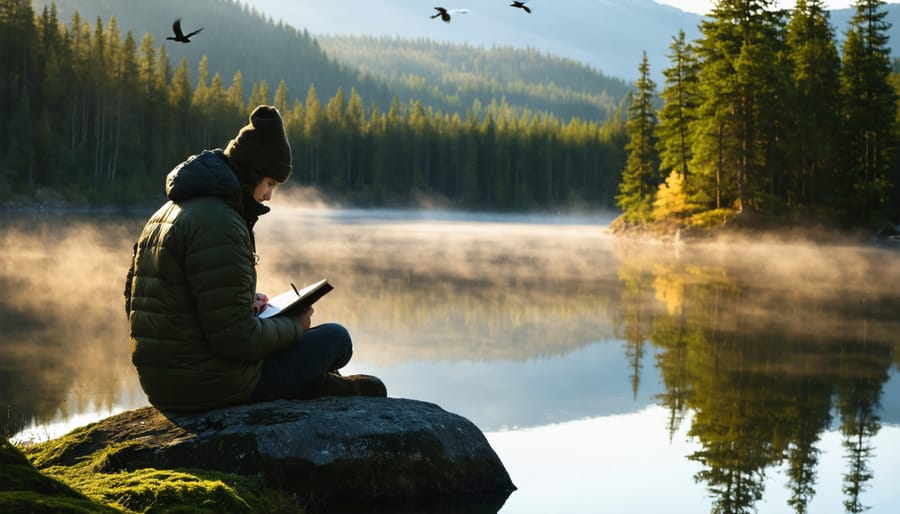
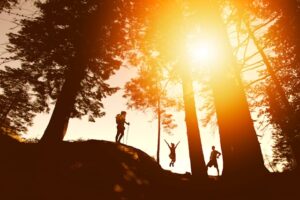
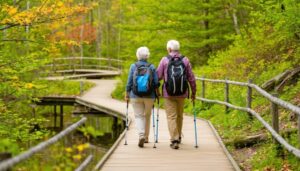

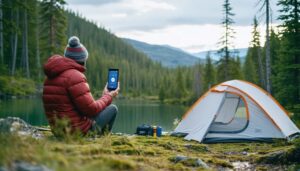

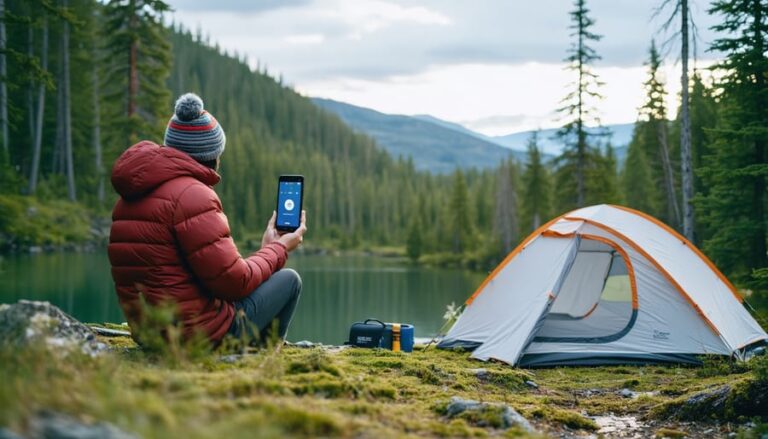

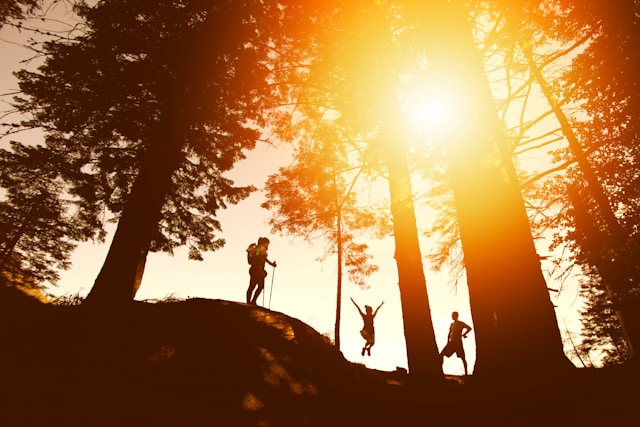
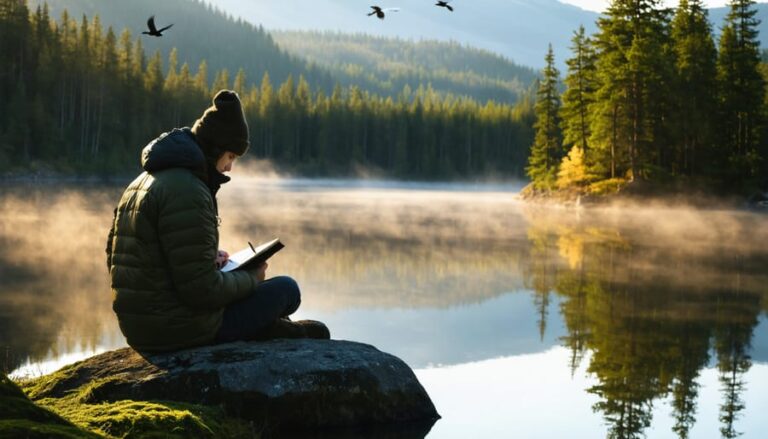

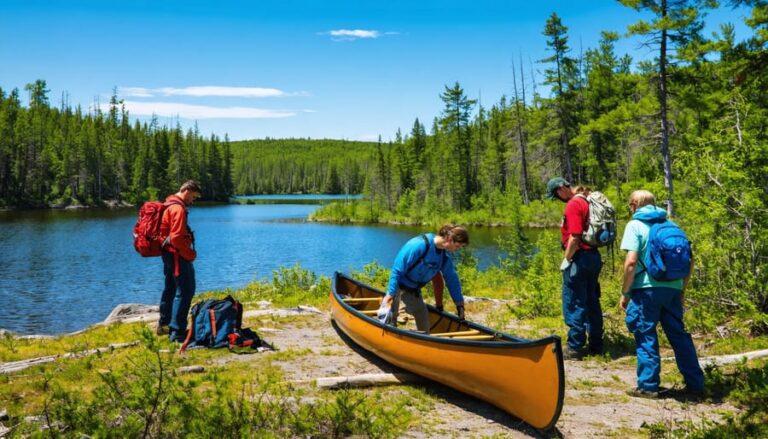
+ There are no comments
Add yours